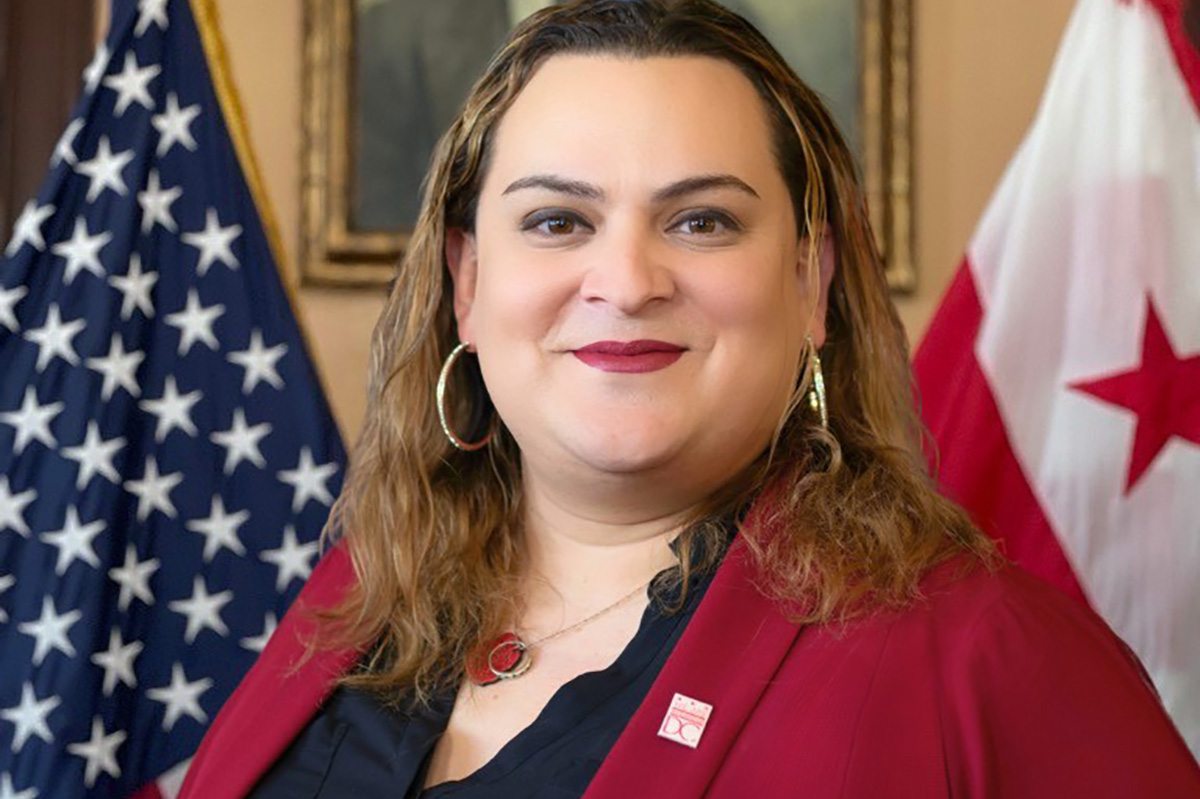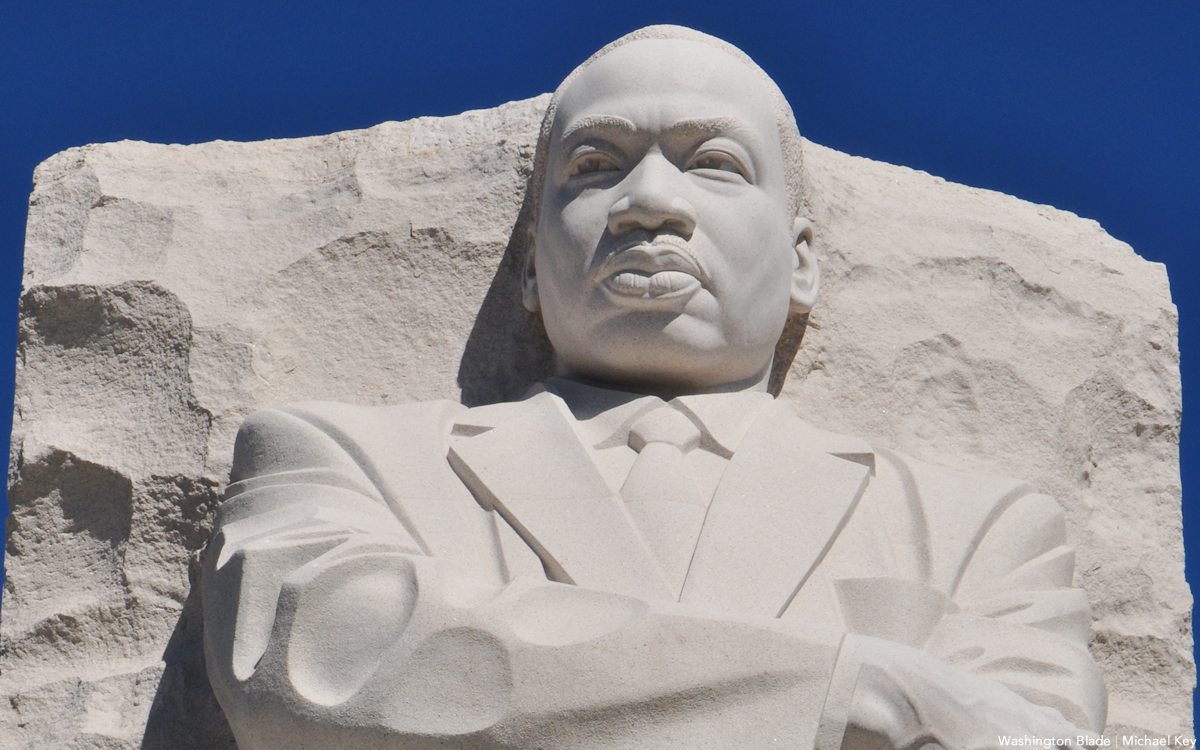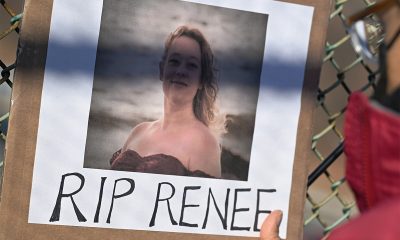News
Trump budget assailed for ‘troubling’ cuts to LGBT civil rights
Proposal would zap agency charged with enforcing Obama LGBT order


President Donald Trump has proposed a budget that includes cuts to civil rights agencies. (Washington Blade photo by Michael Key)
President Trump’s commitment to upholding civil rights for LGBT people has come into renewed question in the wake of a budget proposal that makes substantial cuts to agencies enforcing non-discrimination laws and cumulative actions over the course of his administration undermining those statutes.
Trump’s $4.1 trillion budget proposal for fiscal year 2018 — unveiled late last month — calls for major cuts from Obama-era levels to civil rights agencies within federal departments across the board, including the Justice Department, the Department of Health & Human Services and the Education Department.
Also, the budget proposes the elimination of the Labor Department’s Office of Federal Contract Compliance — which is charged with enforcing President Obama’s executive order barring anti-LGBT workplace discrimination among federal contractors — and merging it with the U.S. Equal Employment Opportunity Commission, the U.S. agency that enforces federal employment non-discrimination law.
Sharita Gruberg, associate director of LGBT research and communications for the Center for American Progress, said the proposed cuts are “really troubling” for the continued enforcement of laws barring discrimination against LGBT people.
“There are cuts across every single federal agency charged with enforcing civil rights laws and it would undo a lot of the gains that we’ve gotten over the last administration in ensuring that civil rights are robustly enforced,” Gruberg said.
A White House Office of Management & Budget official pointed to other aspects of the Trump budget the administration says demonstrates a commitment to civil rights, such as $2.7 million for the Education Department’s Civil Rights Data Collection program, which is three times more than what was planned for FY-17.
“The president’s budget proposal maintains the administration’s commitment to the enforcement of the nation’s civil rights laws,” the official said. “It straightlines funding for DOJ’s Civil Rights Division, supporting efforts to combat human trafficking; prosecute hate crimes; protect the rights of U.S. workers, service members, and veterans; safeguard the voting rights for all Americans; and promote fair housing and educational opportunities.”
For the HHS Office of Civil Rights, the Trump budget proposes a 15 percent cut — down from an estimated $53 million from FY-17 to $44 million in FY-18 — and a 10 percent staff reduction, from 177 to 161.
That office is charged with enforcing Section 1557 of the Affordable Care Act, which bars discrimination on the basis of sex in health care. The Obama administration issued a rule clarifying that provision applies to transgender people, ensuring access to transition-related care and gender reassignment surgery.
Although U.S. District Judge Reed O’Connor in Texas issued an injunction barring the Obama administration from applying the Section 1557 to cases of transgender discrimination, Gruberg said the HHS Office of Civil Rights “presumably should still be investigating complaints from LGBT people of discrimination in health care” and the cuts would be harmful.
“These are complaints that would not get the resources or staffing needed to ensure that they are investigated and that LGBT people are getting the health care that they’re entitled to without discrimination,” Gruberg said.
For the Education Department’s Office of Civil Rights, which is charged with enforcing Title IX of the Education Amendments of 1972, the funding is maintained between FY-17 and FY-18 at $107 million. However, with the same level of funding the proposed budget calls for a seven percent reduction in staff, from 569 employees to 523.
Courts are beginning to construe Title IX, which bars discrimination on the basis of sex, to apply to LGBT students. The Obama administration issued guidance indicating schools that bar transgender kids from the restroom consistent with their gender identity may lose funding under this law, but U.S. Attorney General Jeff Sessions and Education Secretary Betsy DeVos revoked the guidance.
Even though the Trump administration rescinded the guidance, Gruberg said the Education Department’s Office of Civil Rights is still charged with investigations under Title IX, citing a 75 percent increase in complaints from 2009 to 2015.
“The law is still the law and this would hurt the office’s ability to provide technical assistance about what their obligations are under the law even without the guidance in place,” Gruberg said.
For the Justice Department’s Civil Rights Division, the Trump budget proposes the elimination of 121 staff positions. That division is responsible for upholding civil rights laws, including Title VI of the Civil Rights Act of 1964, which bars employment discrimination based on sex, and the Violence Against Women Act, which specifically bars anti-LGBT discrimination in domestic abuse relief programs.
Under former U.S. Attorney General Loretta Lynch, the civil rights division filed a lawsuit against North Carolina’s anti-LGBT House Bill 2 based on the laws before the litigation was withdrawn under Trump.
“At a time when they filed the most criminal civil rights complaints and trafficking complaints ever, this staffing cut will severely diminish the ability of DOJ civil rights to file and prosecute criminal and civil rights violations,” Gruberg said.
In addition to merging OFCCP with EEOC, the budget calls for the elimination of 130 full-time staff positions from the latter agency since FY-17, although funding would be flatlined at $364 million.
Gruberg said the cuts were “shocking” and the proposed merger spells trouble because OFCCP has oversight authority to investigate federal contractors for violations unlike EEOC, which generally awaits discrimination complaints filed by employees before taking action.
“They’re able to proactively investigate the status of equal opportunity at companies receiving taxpayer funds and ensure that they are not discriminating in ways that individuals employees might not be able to really grasp, such as hiring disparities, pay disparities, some of these systemic issues that an individual employee in their position might not know what’s happening to them,” Gruberg said.
The Department of Housing & Urban Development is also charged with enforcing a non-discrimination policy for LGBT Americans, a Obama administration rule barring anti-LGBT discrimination in government-sponsored housing and homeless shelters.
But assessing the capacity to enforce the rule is hard, Gruberg said, because that task is spread out across the agency. Primarily, HUD implements the rule through the Office of Fair Housing & Equal Opportunity, but the gender identity equal access piece is primarily implemented by the Office of Community Planning & Development, she said.
In Trump’s proposed budget, staffing levels for the Office of Fair Housing & Equal Opportunity would decrease by 10 and 26 full-time equivalents would be cut from Office of Community Planning & Development.
The proposed reductions in the budget for the enforcement of civil rights law are consistent with assertions the Trump administration has undertaken actions undermining civil rights, including a travel ban, review of police consent decrees and formation of an “election integrity” task force that seems to attempt to justify voter suppression efforts. On LGBT rights, the Trump administration has made anti-LGBT appointments, omitted LGBT questions from federal surveys and declined to defend LGBT rights measures in court.
Led by the Leadership Conference on Civil & Human Rights, a coalition of more than 100 groups this week co-signed a letter to Trump earlier this week urging him to reverse course and defend civil rights.
“Our nation should honor equal protection for all, view its diversity as its strength, and strive to be an inclusive place where all in America can live, work, study, and participate in our democracy as free and equal people,” the letter says. “We call on you and your administration to take affirmative steps to halt the problematic policies and initiatives we have outlined, and to provide positive leadership on these issues in order to promote inclusion and respect for the basic rights and dignity of every person in America.”
The EEOC doesn’t seem fazed by the prospects of having to implement the duties of OFFCP in addition to investigations and prosecutions already underway.
Kimberly Smith-Brown, an EEOC spokesperson, said the merger wouldn’t happen until FY-19 and the agency expects a “smooth transition” into the change.
“The FY 2018 budget refers to the proposed merger which would take place in FY 2019, with 2018 being a transition year during which OFCCP and EEOC would engage in transition talks and planning,” Smith-Brown said. “There were no financial or staffing implications for EEOC in FY 2018. Should the proposal to merge OFCCP and EEOC be approved by Congress, we are committed to a smooth transfer and transition.”
The OFFCP never publicly announced any investigations, charges or victories under Obama’s 2014 executive order against LGBT discrimination. It seems unlikely there were any because the Labor Department usually announces them as they occur.
The Labor Department for a span of years under the Obama administration and Trump administration hasn’t responded to the Washington Blade’s request to comment on whether investigations under the order had taken place.
Even though the EEOC has stated it can handle the transition, Gruberg said she thinks those remarks are aspirational and the proposed changes under the Trump budget aren’t “practically feasible.”
“You’re combining two offices that play very different roles in equal opportunity enforcement,” Gruberg said. “At the same time, you’re severely cutting staffing at these offices. And so, I think the combination of these two moves are really going to hinder the ability of these agencies to secure equal opportunity in the workforce for LGBT people.”
Maryland
Layoffs and confusion at Pride Center of Maryland after federal grants cut, reinstated
Trump administration move panicked addiction and mental health programs

By ALISSA ZHU | After learning it had abruptly lost $2 million in federal funding, the Pride Center of Maryland moved to lay off a dozen employees, or about a third of its workforce, the Baltimore nonprofit’s leader said Thursday.
The group is one of thousands nationwide that reportedly received letters late Tuesday from the Trump administration. Their mental health and addiction grants had been terminated, effective immediately, the letters said.
By Wednesday night, federal officials moved to reverse the funding cuts by the Substance Abuse and Mental Health Services Administration, estimated to total $2 billion, according to national media reports. But the Pride Center of Maryland’s CEO Cleo Manago said as of Thursday morning he had not heard anything from the federal government confirming those reports.
The rest of this article can be read on the Baltimore Banner’s website.

The Comings & Goings column is about sharing the professional successes of our community. We want to recognize those landing new jobs, new clients for their business, joining boards of organizations and other achievements. Please share your successes with us at [email protected].
Congratulations to Vida Rangel, JD/MPP on her promotion to Deputy Director of the Mayor’s Office of Talent and Appointments. Rangel is now the highest-ranking transgender official in the history of District government. On accepting the position Rangel said, “I am proud to step into this leadership role and to continue serving my communities. Our District is full of passionate and knowledgeable people who are committed to public service, and it is an honor to help them explore opportunities to serve their neighbors.”
Rangel has previously served in this office as Director of Operations. Prior to this as Bargaining Committee Chair, Organizing Committee, NCTE United, Nonprofit Professional Employees Union IFTPE Local 70. As Policy Counsel, National Center for Transgender Equality; and Elizabeth Warren for President, lead organizer, Illinois 4th Congressional District. She has worked with, and served on boards of, The Black & Pink National, Federal City Performing Arts Assoc., and LAGBAC.
Rangel earned her bachelor’s in sociology from Sam Houston State University; master’s of Public Policy from Loyola University, Chicago; and Juris Doctor, Loyola University, Chicago.

Congratulations also to James Conlon new PFLAG vice president of Development & Philanthropic Partnerships. Upon his appointment Conlon said, “It is an absolute privilege to join PFLAG National and lead their Development & Philanthropic Partner team into a new era. Right now, LGBTQ+ people and their families are terrified of what the future might bring, and PFLAG must continue to be there. My job is to ensure PFLAG strongly endures and thrives, because never has there been a clearer time for our community to unite in fighting for the dignity and well-being of every LGBTQ+ person.”
Brian Bond, CEO, PFLAG National, said, “At a time when PFLAG National programs and participation in them have grown significantly, even as corporate giving has left a $1.3M gap in our funding, James is a critical new addition to the team. With his vast expertise, James will drive our growth and ensure that PFLAG continues meeting the needs of families and communities across the country.”
Conlon is a seasoned fundraiser who has spent extensive time working with advocates, supporters, and leaders, of the LGBTQ+ movement to understand how to effectively support the community. He began his career as an intern in the Massachusetts State House. He has helped raise more than $60 million for critical causes and candidates. Prior to joining PFLAG James oversaw LGBTQ+ investments and fundraising, with the Democratic National Committee (DNC). Prior to that he served in the same role for Harris-Walz 2024, and additionally served in senior fundraising positions for the Senate Majority PAC, as well as for Representatives Josh Gottheimer, and Conor Lamb.
Conlon earned his bachelor’s degree in political science and government from the University of Massachusetts, Amherst.
District of Columbia
D.C.’s annual MLK Peace Walk and Parade set for Jan. 19
LGBTQ participants expected to join mayor’s contingent

Similar to past years, members of the LGBTQ community were expected to participate in D.C.’s 21st annual Martin Luther King Jr. Day Peace Walk and Parade scheduled to take place Monday, Jan. 19.
Organizers announced this year’s Peace Walk, which takes place ahead of the parade, was scheduled to begin at 10:30 a.m. at the site of a Peace Rally set to begin at 9:30 a.m. at the intersection of Firth Sterling Avenue and Sumner Road, S.E., a short distance from Martin Luther King Jr. Avenue.
The Peace Walk and the parade, which is scheduled to begin at 11 a.m. at the same location, will each travel along Martin Luther King Jr. Avenue a little over a half mile to Marion Barry Avenue near the 11th Street Bridge where they will end.
Japer Bowles, director of D.C. Mayor Muriel Bowser’s Office of LGBTQ Affairs, said he and members of his staff would be marching in the parade as part of the mayor’s parade contingent. In past years, LGBTQ community members have also joined the mayor’s parade contingent.
Stuart Anderson, one of the MLK Day parade organizers, said he was not aware of any specific LGBTQ organizations that had signed up as a parade contingent for this year’s parade. LGBTQ group contingents have joined the parade in past years.
Denise Rolark Barnes, one of the lead D.C. MLK Day event organizers, said LGBTQ participants often join parade contingents associated with other organizations.
Barnes said a Health and Wellness Fair was scheduled to take place on the day of the parade along the parade route in a PNC Bank parking lot at 2031 Martin Luther King Jr. Ave., S.E.
A statement on the D.C. MLK Day website describes the parade’s history and impact on the community.
“Established to honor the life and legacy of Rev. Dr. Martin Luther King, Jr., the parade united residents of Ward 8, the District, and the entire region in the national movement to make Dr. King’s birthday a federal holiday,” the statement says. “Today, the parade not only celebrates its historic roots but also promotes peace and non-violence, spotlights organizations that serve the community, and showcases the talent and pride of school-aged children performing for family, friends, and community members.”




















